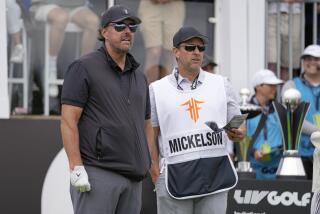Three Surfers Decline to Compete in South Africa : They Jeopardize Their Place in Standings; They Say It’s a Matter of Conscience
- Share via
The tensions of world politics and surf competition have become intertwined for several individuals, including two-time world champion Tommy Carroll of Australia, who is boycotting the South African segment of the professional tour, which starts today at Cape Town.
Carroll, Santa Barbara’s Tom Curren, ranked fourth in the world, and England’s Martin Potter, ranked fifth, will not compete in three South African tournaments in protest of the country’s policy of apartheid.
“Every time I go to compete there I feel through the media I’d be supporting what their cause is,” Carroll said from his home in Newport, Australia. “It was working on my conscience. It’s always been very depressing. It just doesn’t seem there are any human rights there. I’ve been upset with the situation ever since I first went to Africa when I was 19. I’ve never been old enough to gain the strength to make the decision.”
Potter, who lived in South Africa for 15 years, failed to register for the army and could face criminal charges if he returns to the country. Potter said that as a British subject he wasn’t required to serve, but he is unsure whether he would face charges of evading military service if he returned.
“But it’s not the main reason I’m not returning,” he said. “I don’t agree with what they’re doing, with what they’re fighting for over there.”
By missing the three South African events, the surfers are jeopardizing their chances of winning the world championship. The 11-month tour has a total of 20 events. A tournament win is worth 1,000 points in the overall ratings, second place is worth 860 and third 730 down to 25 points for those as low as 70th place. Carroll won last season’s tour by less than 1,000 points over South Africa’s Shaun Tomson, who is competing in his homeland this summer.
Carroll opened the season with a victory in Japan, Curren tied for third and Potter tied for fifth. Carroll also won the tour’s second tournament last weekend on a wave pool at Allentown, Pa.
Carroll’s boycott is not totally an altruistic gesture, according to some members of the Assn. of Surfing Professionals.
At the crux of the matter is money, some claim. Carroll, who won last season’s title with a dramatic finish against Tomson in Australia, has recently ended a contractual relationship with South African sportswear firm Instinct.
Carroll, 23, was sponsored by Instinct, a firm started and partially owned by Tomson, for two years. After announcing his intent to boycott part of the tour, Carroll dropped Instinct for Australian-based Quiksilver.
“It was very convenient for him to use the boycott as an excuse to leave my company,” Tomson said. “There’s a lot more to his decision than conscientiousness. It’s called finance.”
Peter Mansted, Carroll’s manager, said Tomson did not have Carroll’s best interest last May when the two were battling for the world title, and as a result sought a change of sponsorship.
The conflict escalated into the political arena when Instinct clothing threatened to petition for an injunction in Australia and the United States to stop Carroll from switching companies.
Carroll appealed to his government, and Prime Minster Peter Hawkes, facing an image crisis over an Australian cricket team’s recent tour of South Africa, turned Carroll’s plight into a national issue.
In a letter to Carroll, Hawkes said: “In taking this courageous decision (to boycott), you are setting an inspiring example for millions of young Australians.”
He has offered Carroll legal assistance if the quarrel reaches the courts.
Carroll, who left secondary school to compete and travel at age 17, said he hopes his boycott doesn’t give surfing a bad reputation.
“It was purely a personal decision,” he said. “I didn’t influence others to join me. I hope what I’ve done is the right thing.”
More to Read
Go beyond the scoreboard
Get the latest on L.A.'s teams in the daily Sports Report newsletter.
You may occasionally receive promotional content from the Los Angeles Times.










